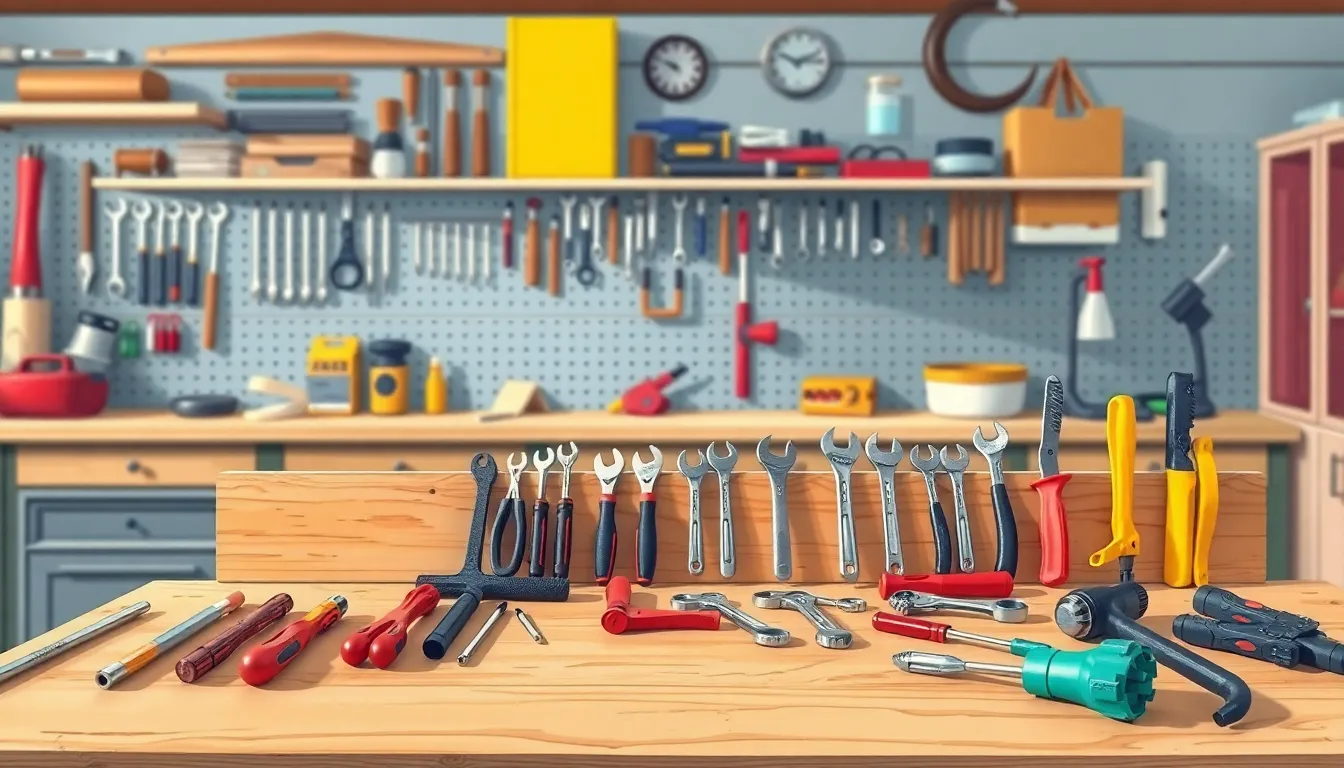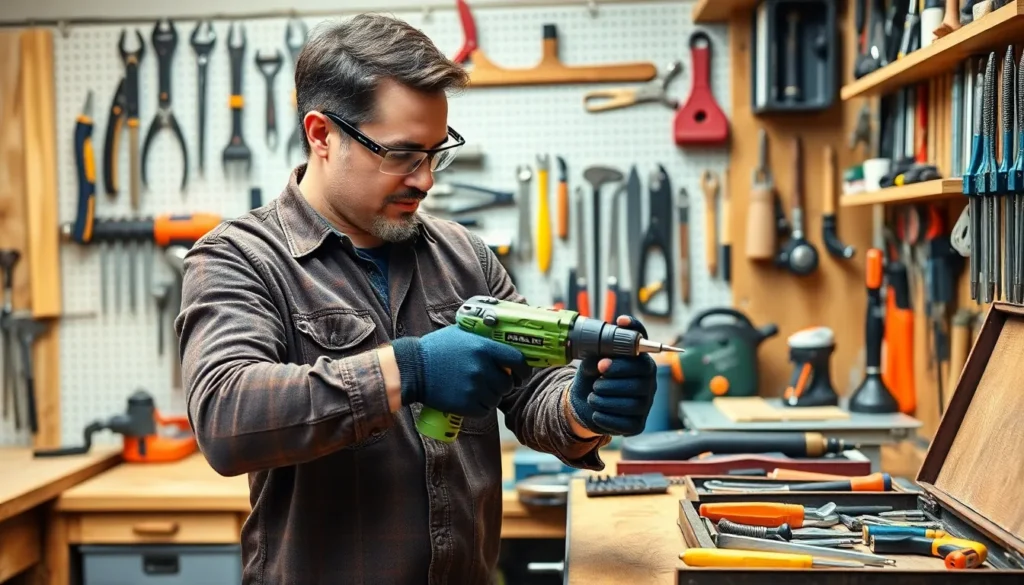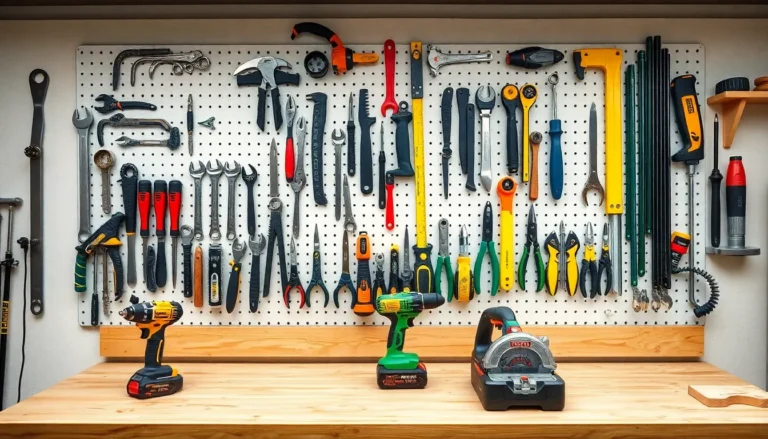Every DIY enthusiast knows that the right tools can turn a simple project into a masterpiece. Whether it’s fixing a leaky faucet or building a treehouse, having the right workshop tools and equipment can make all the difference. Imagine trying to hammer a nail with a shoe—frustrating, right? That’s why investing in quality tools isn’t just smart; it’s essential for achieving those “wow” moments.
Table of Contents
ToggleOverview of Workshop Tools and Equipment
Workshop tools and equipment play a critical role in the success of any DIY project. Quality hand tools, such as hammers, screwdrivers, and saws, allow individuals to perform tasks with precision. Power tools like drills and circular saws significantly enhance efficiency and make challenging jobs more manageable.
Basic tools should include essential items for woodworking, metalworking, and home repairs. These items often comprise measuring tools, such as tape measures and squares. Safety equipment like goggles and ear protection ensures that users minimize risks while working.
Specialized tools cater to specific tasks, allowing for creative and effective project outcomes. For example, a band saw enables intricate cuts that hand tools can’t achieve. A router helps create detailed edges and designs on wood pieces, offering versatility for various projects.
Organization in the workshop promotes productivity. Toolboxes and pegboards support easy access to frequently used items. Keeping tools in designated spaces prevents clutter and saves time during work sessions.
Investing in durable equipment enhances overall performance and longevity. Premium materials resist wear and tear, resulting in fewer replacements over time. Well-maintained tools deliver consistent results, contributing to the quality of completed projects.
Selecting essential workshop equipment depends on the type and scope of intended projects. Beginners may start with a basic toolkit that covers fundamental tasks. Experienced DIYers often expand their collections with advanced tools tailored to specific needs.
Essential Hand Tools

Hand tools play a crucial role in any workshop. They offer precision and control for various projects while ensuring quality results.
Screwdrivers
Screwdrivers come in different types and sizes, essential for driving screws effectively. Phillips and flathead screwdrivers represent the most common designs, each tailored for specific screw heads. A set of interchangeable bits enhances versatility, accommodating various fasteners. Quality screwdrivers feature comfortable grips and durable materials, ensuring user satisfaction during extended use. For optimal performance, users should maintain a well-organized screwdriver collection, allowing for quick access during tasks.
Wrenches
Wrenches provide essential leverage for tightening and loosening nuts and bolts. Adjustable wrenches offer flexibility, accommodating multiple sizes without the need for a full set. Socket wrenches, on the other hand, deliver superior torque and speed, making them ideal for automotive work. Quality wrenches are manufactured from hardened steel for durability and maximizing strength. Keeping wrenches in a dedicated storage space promotes organization and reduces the chance of misplacing tools during projects.
Hammers
Hammers serve as fundamental tools for driving nails and performing various tasks. Claw hammers feature a dual-purpose design, with one end used for driving and the other for removing nails. Dead blow hammers reduce rebound when striking, ensuring a controlled impact. Selecting hammers based on specific project needs enhances execution and efficiency. Quality materials, such as forged steel, contribute to the longevity and effectiveness of hammers, making them indispensable in any workshop.
Power Tools in the Workshop
Power tools enhance efficiency and precision in various projects. They are essential for anyone looking to tackle more complicated tasks.
Drills
Drills serve multiple functions in the workshop. Cordless drills offer portability and convenience, allowing users to work in tight spaces without being tethered to an outlet. Different drill bits cater to various materials, from wood to metal, providing versatility. Additionally, impact drills deliver higher torque, making them ideal for driving screws and fasteners into tougher surfaces. Selecting a drill with adjustable speed settings further customizes it to task requirements.
Saws
Saws are pivotal for cutting materials accurately. Circular saws stand out for their ability to make straight cuts quickly, while jigsaws excel in curved cutting applications. Band saws enable intricate designs and are favored for cutting intricate shapes in thicker materials. Furthermore, miter saws provide precise angle cuts, which are essential in framing projects. A balanced selection of saws, each suited for specific tasks, enhances overall productivity in the workshop.
Sanding Equipment
Sanding equipment plays a vital role in achieving smooth finishes. Orbital sanders are popular for their ease of use and ability to reduce swirl marks on surfaces. Belt sanders are powerful tools best suited for aggressive material removal and leveling surfaces. In contrast, detail sanders focus on precision work in tight corners and intricate designs. Combining different sanding tools optimizes the finishing process, ensuring surfaces are ready for painting or sealing.
Safety Equipment and Accessories
Safety equipment and accessories play a crucial role in a workshop. Proper gear minimizes injury risks and ensures a safer work environment.
Personal Protective Equipment
Personal protective equipment (PPE) is essential for any DIY project. Safety goggles protect the eyes from dust and debris during cutting or sanding. Ear protection safeguards hearing when using loud power tools. Gloves, available in various materials, shield hands from sharp objects and chemicals. Respirators or masks filter out harmful dust and fumes, greatly enhancing air quality. Choosing the appropriate PPE improves safety significantly during any task.
First Aid Kit
A well-stocked first aid kit is vital for any workshop. This kit should include adhesive bandages, antiseptic wipes, and gauze for treating minor injuries. Scissors and tweezers aid in removing splinters or tape. Pain relievers provide quick relief for discomfort, while a cold pack helps with swelling. Regularly checking the kit ensures supplies remain replenished and useful. Having a first aid kit on hand promotes a safer working environment and enables quick responses to accidents.
Maintenance of Workshop Tools and Equipment
Routine maintenance extends the life of workshop tools and equipment. Regular cleaning minimizes dirt accumulation, which affects performance. In addition, sharpening blades and bits produces cleaner cuts, enhancing project quality.
Inspection of tools for wear or damage plays an essential role in safety and effectiveness. Identifying issues early prevents accidents and costly repairs. Lubrication keeps moving parts functioning smoothly, thereby maintaining efficiency.
Storage solutions also contribute to the preservation of tools. Proper storage prevents rust and physical damage, reducing the likelihood of corrosion. Utilizing toolboxes and racks enables organization while providing protection from the elements.
Documentation of service history helps track maintenance schedules. Establishing reminders for inspections and replacements keeps tools in optimal condition. Having a well-maintained inventory ensures ready access when needed.
Certain tools require specialized care. For instance, power tools may need periodic servicing to maintain electrical components. Hand tools, on the other hand, benefit from consistent cleaning and proper storage to avoid damage.
Safety gear also requires attention. Checking safety goggles, gloves, and ear protection regularly ensures they remain effective. Replacing worn-out personal protective equipment (PPE) maintains safety standards in the workshop.
Being diligent about maintenance promotes a productive work environment. Establishing a routine checklist ensures all tools receive necessary care. Investing time in maintenance ultimately leads to better results in DIY projects and enhanced longevity of equipment.
Having the right workshop tools and equipment is crucial for anyone looking to tackle DIY projects effectively. Quality tools not only enhance precision and efficiency but also contribute to safety in the workspace. By investing in durable hand and power tools tailored to specific tasks, individuals can achieve impressive results and elevate their craftsmanship.
Organization plays a key role in maximizing productivity, making it essential to implement smart storage solutions. Regular maintenance of tools ensures longevity and optimal performance, allowing DIY enthusiasts to focus on their creative endeavors. Prioritizing safety with appropriate gear further enhances the workshop experience, ensuring a secure environment for all projects.






